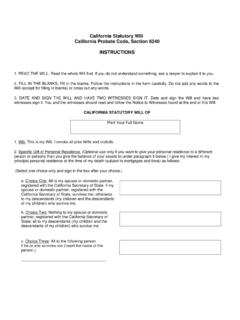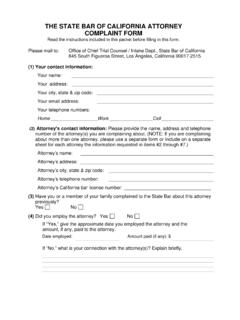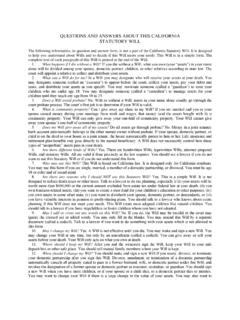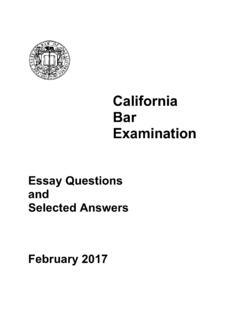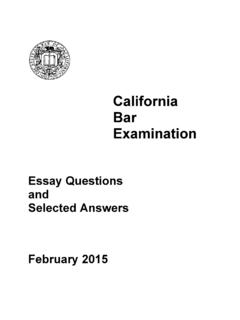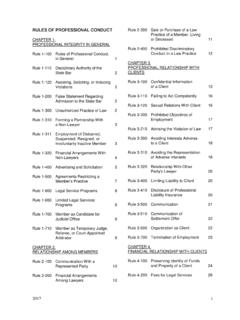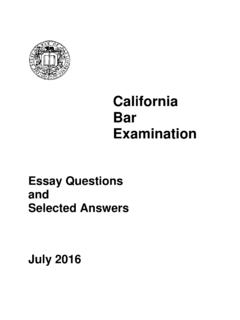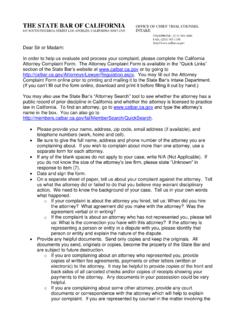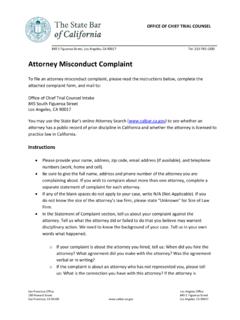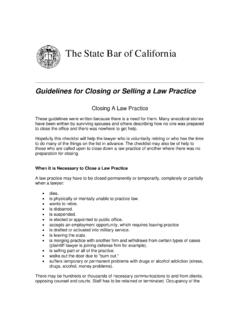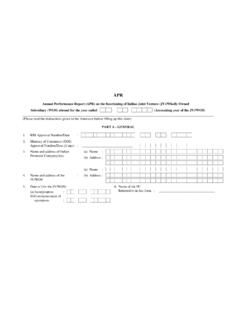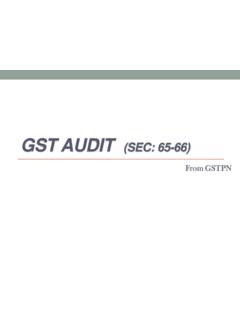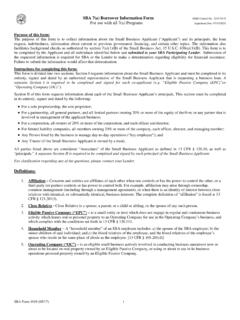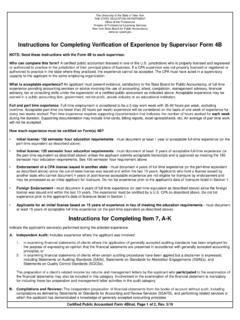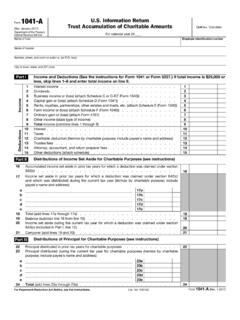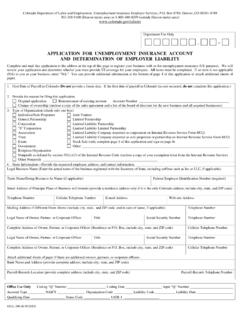Transcription of California Bar Examination - State Bar of California
1 California Bar Examination Essay Questions and Selected Answers July 2017 The State Bar Of California Committee of Bar Examiners/Office of Admissions 180 Howard Street San Francisco, CA 94105-1639 (415) 538 -2300 845 S. Figueroa Street Los Angeles, CA 90017-2515 (213) 765-1500 ESSAY QUESTIONS AND SELECTED ANSWERS JULY 2017 California BAR Examination This publication contains the five essay questions from the July 2017 California Bar Examination and two selected answers for each question. The answers were assigned high grades and were written by applicants who passed the Examination after one read. The answers were produced as submitted by the applicant, except that minor corrections in spell ing and punctuation were made for ease in reading.
2 They are reproduced here with the consent of the authors. Question Number Subject 1. Community Property 2. Professional Responsibility / Evidence 3. Remedies 4. Civil Procedure 5. Torts ESSAY Examination INSTRUCTIONS Your answer should demonstrate your ability to analyze the facts in the question, to tell the difference between material facts and immaterial facts, and to discern the points of law and fact upon which the case turns. Your answer should show that you know and understand the pertinent principles and theories of law, their qualifications and limitations, and their relationships to each other. Your answer should evidence your ability to apply the law to the given facts and to reason in a logical, lawyer-like manner from the premises you adopt to a sound conclusion.
3 Do not merely show that you remember legal principles. Instead, try to demonstrate your proficiency in using and applying them. If your answer contains only a statement of your conclusions, you will receive little credit. State fully the reasons that support your conclusions, and discuss all points thoroughly. Your answer should be complete, but you should not volunteer information or discuss legal doctrines that are not pertinent to the solution of the problem. Unless a question expressly asks you to use California law, you should answer according to legal theories and principles of general application. QUESTION 1 Wanda, a successful accountant, and Hal, an art teacher, who are California residents, married in 2008. After their marriage, Wanda and Hal deposited their earnings into a joint bank account they opened at Main Street Bank from which Wanda managed the couple s finances.
4 Each month, Wanda also deposited some of her earnings into an individual account she opened in her name at A1 Bank without telling Hal. In 2010, Hal inherited $10,000 and a condo from an uncle. Hal used the $10,000 as a down payment on a $20,000 motorcycle, borrowing the $10,000 balance from Lender who relied on Hal s good credit. Hal took title to the motorcycle in his name alone. The loan was paid off from the joint bank account during the marriage. At Wanda s insistence, Hal transferred title to the condo, worth $250,000, into joint tenancy with Wanda to avoid probate. The condo increased in value during the marriage. On Hal s 40th birthday, Wanda took him to Dealer and bought him a used camper van for $20,000, paid out of their joint bank account, titled in Hal s name.
5 Hal used the camper van for summer fishing trips with his friends. In 2016, Wanda and Hal permanently separated, and Hal filed for dissolution. Just before the final hearing on the dissolution, Hal happened to discover Wanda s individual account, which contained $50,000. What are Hal s and Wanda s rights and liabilities, if any, regarding: 1. The condo? Discuss. 2. The motorcycle? Discuss. 3. The camper van? Discuss. 4. The A1 Bank account? Discuss. Answer according to California Law. QUESTION 1: SELECTED ANSWER A California is a community property State . Unless the parties have agreed otherwise in writing, all property acquired during the course of marriage is presumed to be community property (CP). Property acquired before marriage and after the marital economic community has ended is presumed to be separate property (SP).
6 In addition, property acquired by gift, devise, or descent is presumed to be SP as well. To determine the characteristic of an asset, courts generally trace the property to the assets that were purchased. At divorce, all CP is equally divided between the parties unless they have otherwise agreed in writing, orally stipulated to in open court, or an exception applies to the general rule of equal division of CP at divorce. A spouse's SP remains his or her SP at divorce. With these general principles in mind, each property will be assessed individually. The Condo At issue is whether the condo is completely part of Hal's (H) SP or whether the community estate has an interest in the condo. As stated above, property acquired by gift or devise, such as an inheritance, is presumed to be SP of the spouse receiving the gift/inheritance.
7 Here, H's uncle left him the condo and Hal inherited it. Therefore, unless H and Wanda (W) expressly agreed in writing that it was to change from SP to CP, H owned it as SP alone. However, the facts indicate that H transferred the title to the condo to W into a joint tenancy with W to avoid probate. Therefore, at issue is whether this vested the community estate with an interest in the apartment. In California , property that is held in joint form is presumed to be CP. Therefore, when H transferred his interest in the Condo to W as joint tenants, the law will presume that he intended to gift the condo to the CP and for each to hold as joint tenants with right of survivorship. When property that is held in joint form is to be divided at divorce, two statutes apply.
8 First, in order for the transferring spouse to have an interest of ownership it must establish that there was either a written agreement that he was to hold it as SP or that the deed itself contains language that the property is only to be SP. Here, no such written agreement exists. On the contrary, W and H agreed to transfer the condo to W and H as joint tenants. However, a spouse who "gifts" SP to CP is entitled to reimbursements for down payment, principal payments for the mortgage, and for improvements made to the property. Here, H essentially paid the price of the condo $250k when he transferred it from his SP to CP. Therefore, he will be entitled to receive a $250k return on the apartment's value if it is deemed to be CP. The remainder of the condo's apartment will be CP.
9 However, H can argue that the transaction should be set aside because it is presumptively obtained through undue influence and, therefore, void. In the course of dealing with one another, spouses owe the same duties as those who are in confidential relationships. This duty imposes upon them the highest duty of good faith and fair dealing when the spouses enter into transactions with each other during their marriage. If one spouse gained an unfair advantage over the other in a transaction, the court will presume that the transaction was obtained via undue influence and, thus, invalidate it. The spouse who obtained the advantage will have the burden to prove that the transaction was entered into by the other spouse freely and voluntarily with full knowledge of all the facts relevant to the transaction and the basic effect of the transaction.
10 Here, H will argue that W insisted that he transfer the property into both of their names as joint tenants to avoid probate. H will argue that because W was an accountant, he believed her word and relied on her professional experience to believe that the best move for the couple was indeed to hold it as joint tenants. Furthermore, he will argue that as an art teacher who knows nothing about estates and marital property, he relied on her word and did not know that holding as joint tenants will deprive him of full interest in the condo if they were to divorce. W has the burden here. She will have to show that she explained everything to H and that she indeed told him of the basic effect of the transaction. However, this does not appear to be the case. It appears that all W did was insist that H transfer it to avoid probate, but did not inform him of any other consequences that such a transfer may have.
